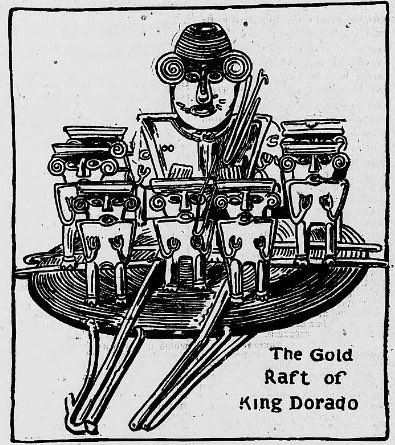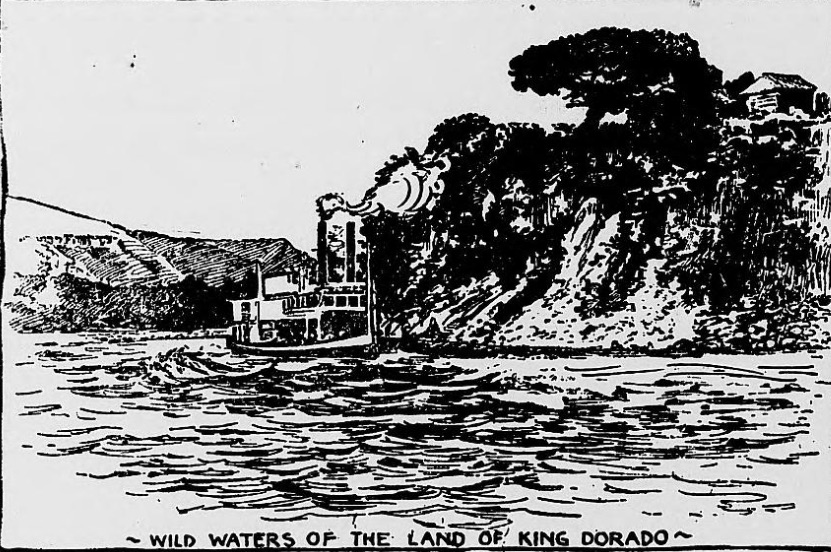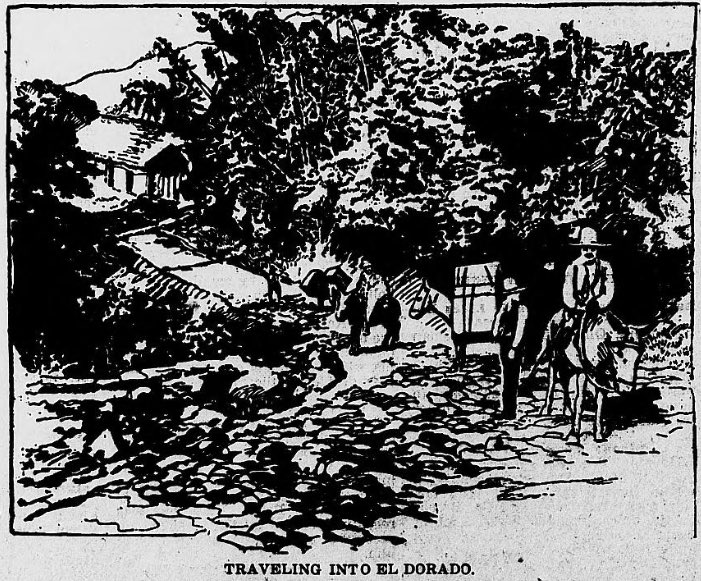
The following article announcing the discovery of El Dorado back in 1900 provides us with the interesting backstory of the myth behind the fabled kingdom of gold.

King Dorado’s Land Located
The Story of Eldorado According to Modern Research
Eldorado has at last been located, the golden sacrificial raft of its king has been found in a lake in the Columbian mountains, and now an expedition is on its way to drain off the waters of the lake and get some more of the treasure of the “gilded one.”
That region, the rumors of which fired the imagination of the adventurers from the time of the discovery of the New World down to the end of the eighteenth century, and lured the conquistadors through the forests and mountains of South America, and which even at the beginning of the seventeenth century exerted a master influence on the schemes of Sir Walter Raleigh, has given up to modern research the secrets which it guarded for four hundred years.
Begota, the capital of the South American republic of Columbia, lies in a mountain valley eight thousand feet above the level of the sea. In the mountains near Bogota is the lake of Guatavita. The waters of this lake are to be drawn off to find the treasures of Eldorado. From the end of the eighteenth century up to within a few years ago the story of Eldorado has been dismissed as being one of the phantoms which haunted the brains of the early explorers, having no foundation except the inflamed imagination which had been engendered by the wealth of Mexico and Peru. But for the last few years the old legend had been studied, the old chronicles have been examined and the chaff winnowed from the wheat. Explorations have been made, not as the conquistadors made them, in shining mail and with flaunting banners, but as dry and musty archaeologists make them. The result has been the location of Eldorado in the region of Columbia, now known as the department of Cundimamarca, round about the Columbian capital. much gold has already been gathered from the shores of Lake Guatavita, and the company formed to draw off its waters want what treasure remains there.
The story of Eldorado, as modern research has it, is this: Long before the days of Columbus, and down to his time, probably, there reigned in the highlands of what is now Columbia a mighty king who was in alliance with the Incas of Peru. His people were the Chinchas. Stretching southward from Bogota to this day can be seen remnants of the old highway which connected the kingdom of the king of the Chinchas with the domains of his great ally of Peru.

Now the Chinchas were sun worshipers, and their king claimed descent from the sun. For all that is known of his ancestry he might have been also brother to the moon and first cousin to all the fixed stars. But for him and his people it sufficed that he was a descendant of the sun.
Every morning at the rising of the sun, the king came forth in state to do homage to his ancestor, and the mountains and the valley resounded with the acclamations of his people. Their places of worship were upon the shores of streams or of lakes, and of all the holy shores, the shores of Lake Guatavita were the most holy.
To the margin of this lake used to repair pilgrims from all parts of the king’s domains, as now pilgrims go to Mecca or to Rome, and offer their tributes. They came to those waters as the Brahmin of India goes to the Ganges, for the waters thereof were sacred.
The pilgrims all brought offerings of gold and precious stones and cast them into the lake for the propitiation of the sun god. On occasions of high festivals the king himself repaired to the lake and went through the ceremony which has given to the world the word “Eldorado” in its modern meaning. The high priests of the nation met the monarch on the boarder of the lake before daylight and began those mystic rites the major part of which have been lost to history. From out the far times of the lost American empires and kingdoms, however, this much has been rescued. When the first rosy beams kindled upon the mountain tops the beacon fires which announced the coming of the sun god forth from his black tent of night the king, stripped of his royal robes, was anointed with clay by the priests, probably to the sound of weird chants, and the high priest blew gold dust over him until he was coated from head to foot with the precious metal. Then, stepping on board a gilded raft with his chief Caziques, the king was towed out into the middle of the lake. Suddenly, as it does in tropic regions, the sun sprang with its light above the mountains, and there, towering among the nobles, who had accompanied him, shone the descendant of the sun in the reflected beam of his ancestor, while from the vast multitude which surrounded the lake arose joyful acclamations and the sound of barbaric music.
It was the story of this ceremony which was told to the Spaniards who first visited the shores of the new world, and so they called the king of the Chichas “El Dorado” – the gilded. From the description of the king the phrase came to mean his country, and so, made into one word – Eldorado – it became something which the knights and nobles of Castile sought as ineffectually and as valiantly as Galahad sought the Holy Grail, though not with such pure hearts and high ambitions. It is probably that a model in gold of the raft, with the king and his chief Caziques on it, was a favorite offering of the rich pilgrims who came to pay tribute to the sun by throwing their offerings into the sacred lake.

Such a tribute would not only be valuable from a religious point of view, but would also be a delicate piece of flattery for the king. Human nature did not differ much in El Dorado from human nature in New York, and people with an eye to political preferment kept the other eye on the “boss” then as they do now.
One of these votive rafts was found recently imbedded in the soil of the shores of the lake by a German archaeologist, and is now in the museum in Berlin. Gold pieces, evidently offerings, to the value of many thousands of dollars from time to time on the shores of Lake Guatavita, but, as the region, is one to which few Europeans or Americans penetrate, no notice was taken of the fact until recently. Now it has been proved beyond doubt that at the bottom of Lake Guatavita lie untold treasures. The only trouble is to get at them. One or two crude attempts have been made to draw off the waters of the lake and dig out the gold which lies in the soil of its bottom, but such efforts so far have not met with success. Now a well organized expedition is starting out from England to capture, if possible, the gold of El Dorado.
The land of Eldorado was, as a matter of fact, much less prolific in gold than either Mexico or Peru. It was the use that the Chichas made of their gold which appealed to the imagination of the conquistadors. The fame of the sun-descended was spread all along the shores of the Caribbean, and the natives of whom the Spaniards asked their questions regarding the new continent told not only of the “gilded one,” but of his city. As modern research seems to have determined, the capital of the descendant of the sun was built of frame, wooden houses, the sides of which were covered with gayly colored cotton cloth. Gold does not seem to have been much thought of except as it represented the color of the sun and most faithfully reflected his beams. over the cotton cloth which draped the sides of the houses of the prehistoric capital of Chicha were hung many strands of cord, threaded with gold beads, and as the morning breezes swept down from the Cordilleras, these golden strands waved to and fro, making a mighty shimmer in the early sunlight, and to one who serves them from afar, as Philip von Hutton believed he did, the city might well seem to be one of houses and streets of gold.
One of the things which seem to have puzzled those who took the story of Eldorado seriously is that nowhere could be found the city of Manoa, which one Spanish adventurer declared was the capital of the desired country. Now the only authority upon which the name Manoa rests as that of the capital of Eldorado is that of one Martinez, a mutineer, who was set adrift from a Spanish ship. He returned to civilization and declared that he had been cast upon the coast of Guinea and had been conducted through the wilderness to the city names Manoa, which was the capital of Eldorado; that the king of the country was in alliance with the Inca, and that the roofs of the houses of the city were covered with gold. Martinez was a liar. He had heard the story of Eldorado, and it is not hard to seek for the place to which he was taken, for, far up the Amazon river, at the junction of that mighty stream with the Rio Negro, stands the city of Manaos, still bearing its old Indian name, which became Manoa in the Spanish of the romancing Martinez. Or perhaps he was right and Manoa was the original name, and Manaos is a Portuguese corruption of it. But he saw no Eldorado.
Sir Walter Raleigh led no less than two expeditions in search of Eldorado, and so enduring was the belief in the existence of the place that Spanish expeditions in search of the place were sent out as late as the latter part of the eighteenth century. Those who are interested in Eldorado as it appears in fiction should read the well known chapter in Voltaire’s “Candide.” To us of today Eldorado has resolved itself into a question of hydraulics – draining the Lake Guatavita.
Source: The Washburn leader. (Washburn, McLean County, N.D.), 09 June 1900.

